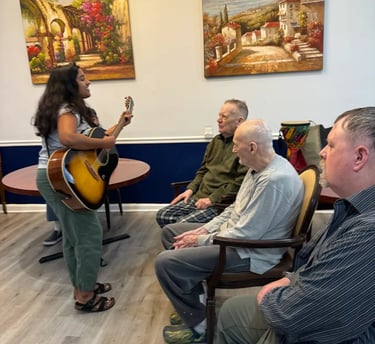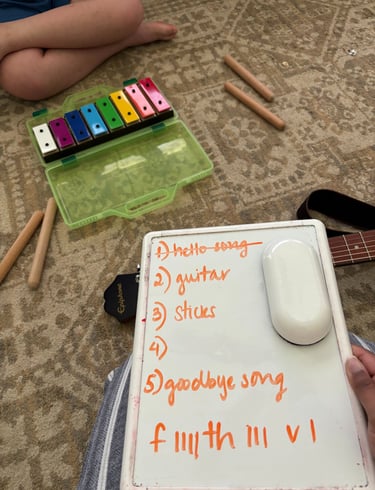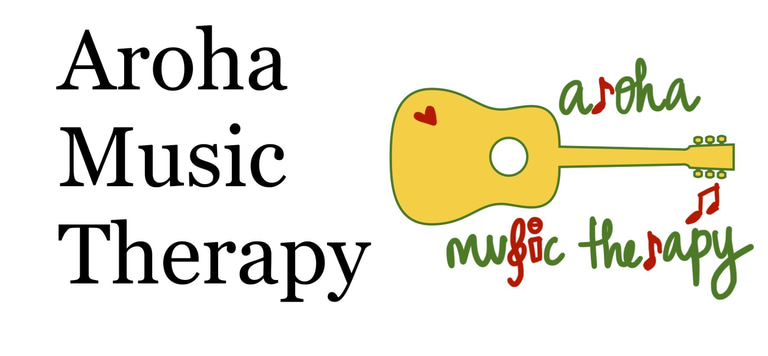What Does a Music Therapist Really Do? Clearing Up Common Misconceptions
A parent’s question sparked a deeper conversation about what music therapy really involves. Learn how music therapists are trained, what assessments look like, and how music supports non-musical goals like sensory regulation, emotional expression, and cognitive growth.
6/20/20252 min read


What Does a Music Therapist Actually Do? A Parent’s Question That Sparked a Larger Conversation
Recently, a parent asked me a thoughtful question that I imagine many others might have, too. She was reviewing the music therapy assessment I had completed for her child and was curious about how I was able to evaluate things like proprioceptive and vestibular functioning. She also asked about my background—specifically, what kind of training and education qualified me to assess those areas in a therapy setting.
What goes into a music therapy assessment?
When I start working with a new client—especially one referred for behavioral needs—I begin by completing an individualized assessment and sharing it with the family. While I’m not certified in Neurologic Music Therapy (NMT), my work is informed by NMT principles and shaped by how each client responds. These assessments help me understand a client’s motor, sensorimotor, auditory and visual processing, cognitive functioning, communication, social engagement, and musical preferences.
From there, I create a treatment plan with clearly outlined goals and objectives. Once the family approves the plan, we begin implementing music-based interventions that support those goals in a way that’s responsive and individualized.
Misunderstandings around the term “music therapist”
This parent’s question reminded me of something I’ve noticed before: many people assume I’m offering something different than I actually am. When folks hear “music therapist,” their attention often goes straight to the “music,” rather than the “therapist.” That’s not unusual—and it’s not offensive—it just highlights the need for more awareness around what music therapy really is.
It can be frustrating at times to be placed in the “musician” or “entertainer” category, especially when the work I do is deeply rooted in clinical training and evidence-based practice. But I also see it as part of my job to advocate for our field and educate others about the services we provide.
What kind of training do music therapists receive?
To become a board-certified music therapist, we complete intensive undergraduate and/or graduate programs that include coursework in music, psychology, anatomy, neuroscience, and clinical ethics. Our education also includes hundreds of hours of supervised clinical practice in a wide range of settings. In fact, we’re encouraged to seek out diverse experiences during our training so we can build flexibility and insight as therapists.
Some music therapists go on to specialize in one area of care. Others—like myself—work across different populations. I currently see clients with behavioral and mental health needs, in hospice and palliative care, and in neurorehabilitation settings.
How music therapy supports non-musical goals
Music therapy is a flexible, goal-oriented approach that can support people in many ways. Depending on the client, I might focus on sensory regulation, social skill-building, emotional expression, pain management, or cognitive rehabilitation. We use musical elements like rhythm, tempo, melody, and lyrics—not as performance tools, but as therapeutic instruments—to help clients access growth and healing.
This versatility is one of the field’s greatest strengths. It also makes music therapy a bit harder to explain to those unfamiliar with it. And that’s okay—conversations like the one I had with this parent are an important part of spreading awareness.
A chance to educate and connect
In the end, I was grateful for the parent’s curiosity. Her question wasn’t just valid—it opened the door to a meaningful conversation, and inspired me to write this post. If you’ve ever wondered what a music therapist really does, I hope this offers some clarity. We’re more than musicians—we’re trained clinicians who use music intentionally to support healing, development, and well-being.


